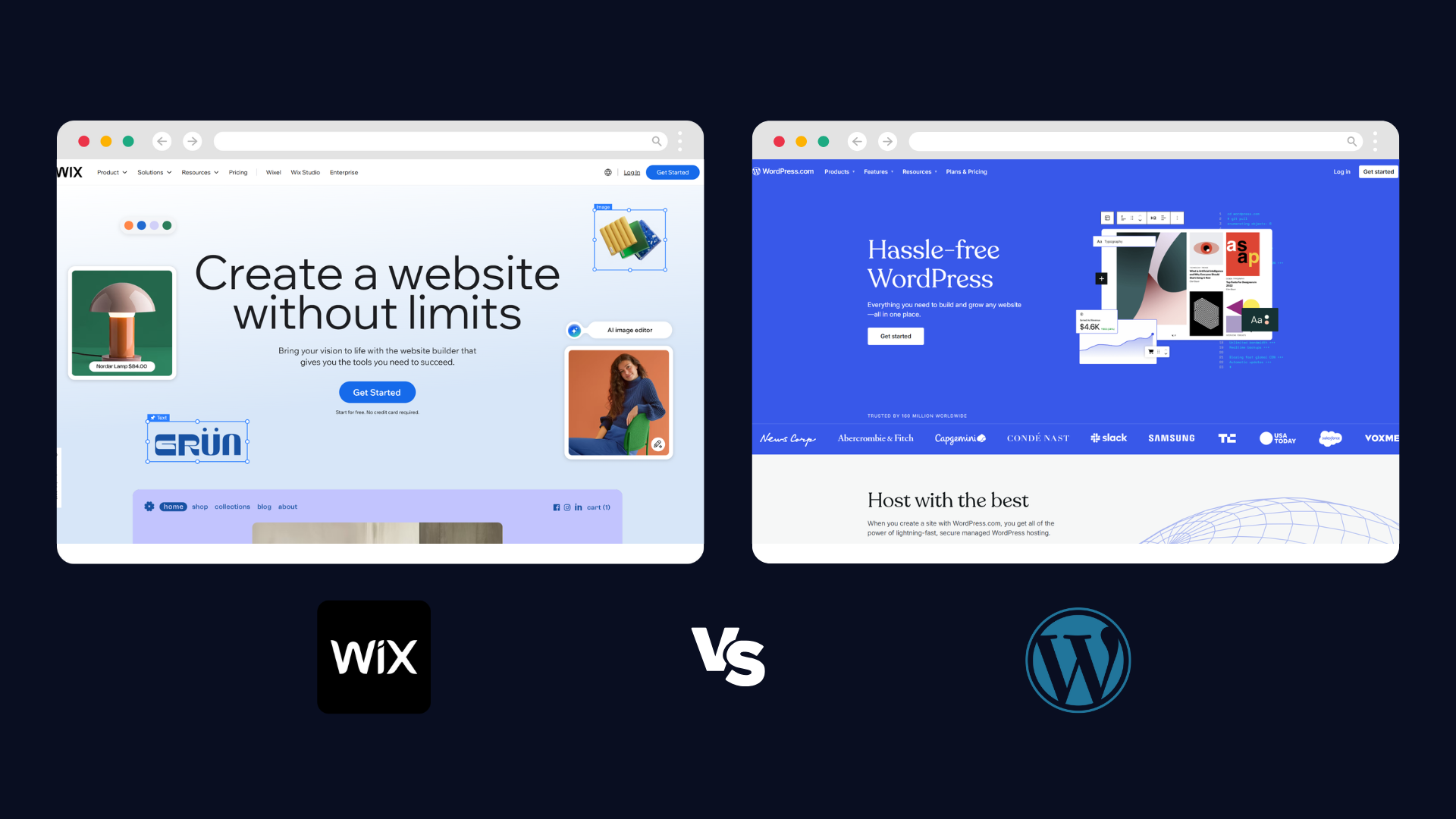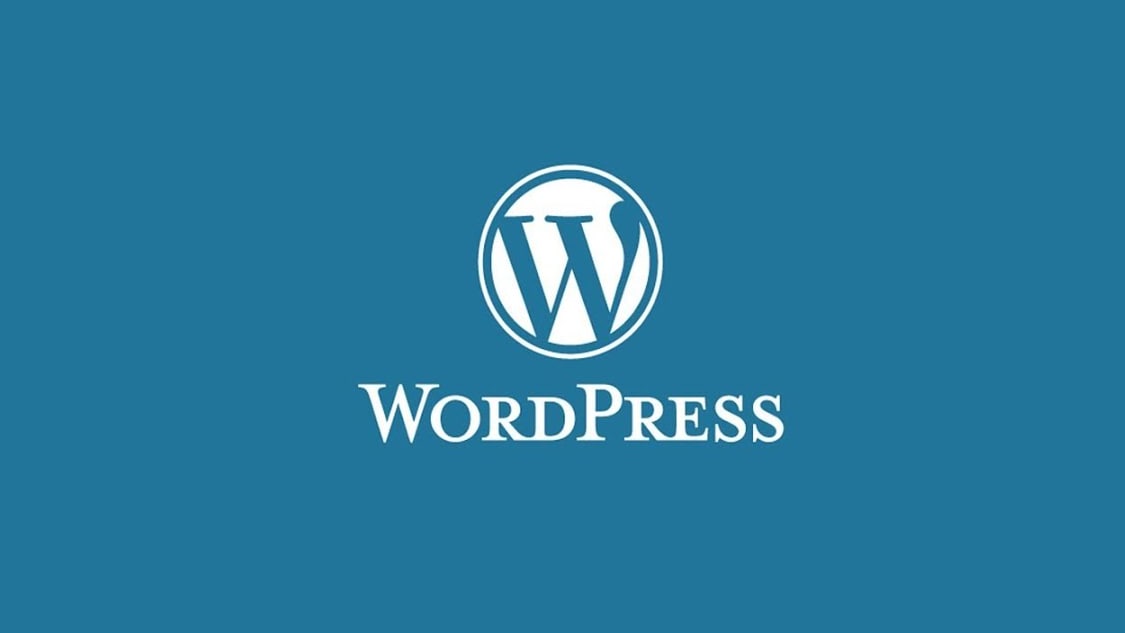Wix vs WordPress: Which website builder is better for small business?
Ultimate no-code showdown for entrepreneurs

Sign up for breaking news, reviews, opinion, top tech deals, and more.
You are now subscribed
Your newsletter sign-up was successful

Wix is designed for beginners and small businesses. You get an easy drag-and-drop editor, loads of templates, and built-in tools for selling online. We love how simple it feels, but power users will notice some limits.
Pros
- Drag-and-drop interface
- 2,000+ templates available
- AI-powered design tools
- Personalized SEO features
- 24/7 support
Cons
- Many features to learn
- No template swapping
- Higher costs for upgrades
- Slow loading times
- Ads on free plan

WordPress.com keeps things versatile for those looking for more options. Its new AI website builder creates sites lightning-fast, but settings can get complex. Still, it's a favorite for serious bloggers and growing businesses.
Pros
- AI website builder
- WordPress plugin ecosystem
- Fast site generation
- Solid SEO features
- Huge community support
Cons
- Some design limits
- Redirect loops in free plan
- Paid plan needed for plugins
- Steeper learning curve
- Complex for beginners
When it comes to the best website builder platforms, there are countless choices. But, Wix and WordPress.com stand out. They’re the go-to website builders for people who don’t want to mess with code.
Wix focuses on drag-and-drop simplicity while WordPress.com brings more plugin options for power users. And in response to the AI boom, both have responded with sleek new features that offer personalized assistance for design and content.
If you're wondering if there's a clear winner, the answer's a bit complex. While we think that Wix does beat WordPress.com overall, there are at least some use cases that the latter is better suited for. Let's get into all of that now.
Wix vs WordPress: A detailed breakdown
Feature | Wix | WordPress.com |
|---|---|---|
Starting price: USD/month | $17 | $4 |
Free plan | Yes | Yes |
Templates | 2,000+ professional themes | 1,000+ mobile-responsive designs |
Editor type | Drag-and-drop, flexible | Block-based, AI-assisted |
Design flexibility | High, with some limits | Standard patterns, customizable |
SEO tools | Built-in, personalized | Basic included, plugins optional |
Ecommerce capabilities | Built-in, paid plans | WooCommerce on business plan |
Support | 24/7 support available for paid users | DIY community and paid support |
Loading speed | Can be slow sometimes | Generally faster than Wix |
Plugin/app availability | 500+ apps | 50,000+ plugins |
Customization | Customizable with restrictions | Highly customizable |
Ads on free plan | Yes, Wix ads | Yes, WordPress.com branding |
Mobile responsiveness | Responsive templates | Responsive themes |
Hosting | Included | Included |
Backup & Security | Managed by Wix | Managed by WordPress.com |
Wix vs WordPress: Features
Wix packs its builder with ready-to-use tools, live drag-and-drop editing, AI-powered layouts, and a huge template gallery covering almost any niche you can imagine. You get built-in ecommerce, booking systems, blog tools, and an App Market full of extra add-ons. Wix’s new AI features handle everything from social media posts to automated loyalty programs, all inside a slick dashboard designed for business growth.
WordPress.com, on the other hand, thrives on its extensibility. The platform starts simple, but its backbone is a library of thousands of themes and plugins. Need an online store, email integrations, SEO, advanced security, or custom workflows? There’s probably a plugin for that. The latest update introduces smarter AI design tools and performance boosters, like native caching, lazy loading, and automated design tweaks. This keeps WordPress.com fast and flexible, while new AI services make it easier to add tailored features as your business grows.
So which one's ultimately better? If you want turn-key features out of the box that can be customized easily, Wix is the best bet. WordPress.com is the better pick if you love tinkering and want to endlessly add or swap advanced tools as your needs change.
Wix vs WordPress: Ease of use
Wix wins hearts for its speed and simplicity. From account setup to website launch, you’re always guided. Just pick a template or let the AI Builder do the heavy lifting by answering a few questions. Its visual editor is pure drag-and-drop, no coding needed. Menus, text, images, and even ecommerce features are all added in real-time, with instant previews. Updates, hosting, and security are handled behind the scenes, giving you more time to run your business.
Sign up to the TechRadar Pro newsletter to get all the top news, opinion, features and guidance your business needs to succeed!
WordPress.com has improved ease-of-use, but it still requires a more hands-on approach. You’ll need to choose a plan, pick a theme, and configure plugins for basic features. The Gutenberg editor gives you block-based visual editing with AI assistance, plus there are good setup wizards. But when it comes to deep customization or adding ecommerce, be prepared for extra reading and tweaking. Advanced features are robust, but they come with a steeper learning curve, especially for total beginners.
If you want a website up today with no headaches or homework, Wix is again the better choice. If you don’t mind digging in and want to learn as you build, WordPress.com pays off in flexibility and skills learned.
Wix vs WordPress: Support
Wix gives you 24/7 direct help for everyone, including free plan users. You get live chat, phone support, a big help center, video tutorials, and step-by-step guides. It’s direct, fast, and personal, great if you need help now or have urgent questions. You even get dedicated resources for new products like Wix Studio and App Builder.
WordPress.com divides support options by plan. Free users rely on extensive guides, community forums, and documentation. Paid users get access to human support, including live chat with company experts. They also offer AI-powered help for common issues now. But the WordPress ecosystem is huge, so the forums are always bustling.
In short, Wix makes it easier to get one-on-one help at any level. WordPress.com gives more flexibility for self-starters, but direct support is better on paid plans.
Wix vs WordPress: Pricing and plans
Wix’s pricing is straightforward, if a bit higher upfront. The free plan lets you build with limited features and Wix ads. Paid plans start at $17/month for essentials, $36/month for small stores, and up to $159/month for advanced business needs. Each step unlocks extra features, from custom domain to greater storage, advanced analytics, and ecommerce tools. You can stay free as long as you want, but most growing businesses need a paid plan for full branding and upgrades.
| Row 0 - Cell 0 | Free | Light | Core | Business | Business Elite |
Price (annual) | $0/month | $17/month | $29/month | $39/month | $159/month |
Price (monthly) | $0/month | $29/month | $39/month | $46/month | $172/month |
Collaborators | None | 2 | 5 | 10 | 15 |
Storage Space | 500MB | 2GB | 50GB | 100GB | Unlimited |
Custom Domain | Not included | Free 1st year | Free 1st year | Free 1st year | Free 1st year |
Ecommerce | None | None | Basic | Standard | Advanced |
Site Analytics | Basic | Basic | Basic | Standard | Advanced |
Marketing Suite | Basic | Basic | Basic | Standard | Advanced |
Dropshipping | None | None | 25 products | 250 products | Unlimited |
Customer Reviews | None | None | None | None | 3,000 reviews |
Sales Tax Automation | None | None | None | None | 500 transactions/month |
Recommended For | Testing | Personal | Small stores | Established | Large brands |
WordPress.com starts lower, with a free plan and paid options from $4/month for personal use. The $8/month premium plan adds custom domains and themes. The $25/month business plan unlocks plugins, advanced SEO, and full design flexibility. This is followed by an ecommerce plan and a much pricier enterprise plan. Costs can rise if you add third-party plugins or premium themes, but you get more control of your spending for smaller budgets.
| Row 0 - Cell 0 | Free | Personal | Premium | Business | Commerce |
Price (paid annually) | $0/month | $4/month | $8/month | $25/month | $45/month |
Price (paid monthly) | $0/month | $5/month | $8/month | $30/month | $45/month |
Storage | 3GB | 6GB | 13GB | 200GB | 200GB |
Custom domain | No | Yes | Yes | Yes | Yes |
Remove WordPress ads | No | Yes | Yes | Yes | Yes |
Support | Community forums | Email support | Live chat | Live chat & email | Live chat & email |
Ecommerce capabilities | No | No | No | Yes (WooCommerce) | Yes (WooCommerce) |
Themes selection | Limited | Standard | Standard | Premium | Premium |
Plugins | No | No | No | Yes | Yes |
If you prefer one flat fee and lots of built-in tools, Wix has clearer pricing. WordPress.com offers better value when you're starting small and scaling over time.
Wix vs WordPress: Final verdict
So, which builder comes out on top? Wix is perfect if you want simplicity, fast setup, and loads of built-in features. You just drag, drop, and go. WordPress.com is better for those who want deeper customization and more control, especially if you don’t mind spending time learning and tweaking. You can start small and scale as your business grows.
In the end, it’s about your needs: choose Wix for ease and WordPress.com for flexibility. Either way, our guide should help you match specific features and pricing details to your current requirements.
Wix vs Shopify: FAQs
Which is easier for beginners, Wix or WordPress.com?
Wix is easier to get started with. You sign up, pick a template, and start editing right away. Its drag-and-drop system is very intuitive, so you won’t feel lost even if you’ve never built a website before. WordPress.com has a steeper learning curve and may require more setup, especially if you want extra features, like plugins or ecommerce.
Can you sell products with both platforms?
Yes, both Wix and WordPress.com offer ecommerce tools. Wix includes store capabilities in higher-tier plans, makes adding products and managing payments straightforward, and is ideal for basic online stores. WordPress.com lets you use WooCommerce (on business plans), which is extremely customizable but needs more setup. Think about what you plan to sell before choosing.
Are there free plans with Wix or WordPress.com?
Both platforms provide free plans. Wix’s free plan lets you build and publish but includes Wix ads. WordPress.com’s free version is more limited and shows WordPress branding. For serious business use, paid plans unlock custom domains, more storage, and extra features.
Which has better customer support?
Wix edges out with 24/7 human support for everyone, even free users. You can get help fast via chat or phone. WordPress.com relies more on guides and forums if you’re on the free plan, but offers premium support to paying users. If access to personal help matters a lot to you, Wix takes the lead.
Can I customize my site more freely with WordPress.com or Wix?
WordPress.com is best for deep customization, thanks to its plugin and theme ecosystem. You can add features, tweak code, and adjust almost everything (on paid plans). Wix is easier but limits your options, what you see is mostly what you get. If customization matters, WordPress.com is the better pick.

Ritoban Mukherjee is a tech and innovations journalist from West Bengal, India. These days, most of his work revolves around B2B software, such as AI website builders, VoIP platforms, and CRMs, among other things. He has also been published on Tom's Guide, Creative Bloq, IT Pro, Gizmodo, Quartz, and Mental Floss.
You must confirm your public display name before commenting
Please logout and then login again, you will then be prompted to enter your display name.